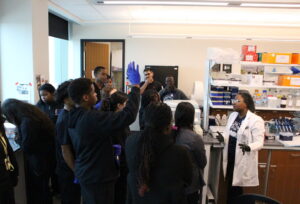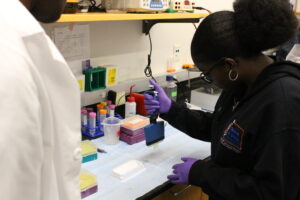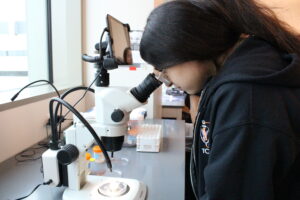Institute for Health Disparities’ “Coaching Up” Mentor Program Empowers Arlington ISD High School Students in STEM
 The University of North Texas Health Science Center’s Institute for Health Disparities hosted nearly 100 freshmen from Bowie High School in Arlington ISD on Friday, March 24 as part of its “Coaching Up” Mentor Program. In partnership with AISD, Coaching Up is an initiative to increase diversity in science, technology, engineering and math higher education and career paths.
The University of North Texas Health Science Center’s Institute for Health Disparities hosted nearly 100 freshmen from Bowie High School in Arlington ISD on Friday, March 24 as part of its “Coaching Up” Mentor Program. In partnership with AISD, Coaching Up is an initiative to increase diversity in science, technology, engineering and math higher education and career paths.
Upward of 30 HSC students earning their doctorates through the School of Biomedical Sciences or medical degrees from the Texas College of Osteopathic Medicine volunteer to mentor these high school students, inspiring them to persist in their studies and become future medical students and professionals.
“The Coaching Up program benefits the students and coaches equally,” said Dr. Jamboor Vishwanatha, Regents professor and vice president of HSC’s Institute for Health Disparities. “High school students gain from mentorship, coaching and role models provided by HSC students, and at the same time, HSC students experience the value of mentoring and coaching the high school students. The program is one step towards the national need to increase the diversity of the STEM workforce through mentorship and networking.”
Coaching Up inspires diversity
Established in 2015, Coaching Up aims to increase the number and diversity of students who graduate from high school and pursue a degree in the biomedical, behavioral, medical and allied health professions. Through interaction with HSC student volunteers, high schoolers broaden their awareness of the possibilities for their future education and careers.
 These AISD students are already part of a career-focused program called P-TECH, Pathways in Technology Early College High Schools, which encourages students who are statistically “least likely to attend college” to earn not only a high school diploma but also a credential or associate degree. In tandem, Coaching Up creates the opportunity for P-TECH students to gain hands-on experience in clinical and laboratory research environments at HSC and create a network that further enables them to persist in their studies and pursue higher education.
These AISD students are already part of a career-focused program called P-TECH, Pathways in Technology Early College High Schools, which encourages students who are statistically “least likely to attend college” to earn not only a high school diploma but also a credential or associate degree. In tandem, Coaching Up creates the opportunity for P-TECH students to gain hands-on experience in clinical and laboratory research environments at HSC and create a network that further enables them to persist in their studies and pursue higher education.
During Friday’s event kickoff, Vishwanatha congratulated the P-TECH students on their achievements. “It’s a credit to yourself to be in this program,” he said.
Executive vice president of research Dr. Brian Gladue also shared some inspiring words. He stressed the importance of education as a “transformative enterprise” where students become critical thinkers who strive to create. He encouraged students to be resilient and proactive in making things happen for themselves. “Resilience is the winning path,” he said.
A path to a health care career
Coaching Up follows AISD P-TECH students throughout their high school tenure. In year one, the program seeks to expose the students to the HSC campus and possible careers in medicine. Years two and three involve laboratory demonstrations as well as seminars and coaching workshops. By the time P-TECH students are high school seniors, they will have been involved with the Coaching Up program at HSC for four years and gained access to the vast resources and innovative people on campus.
Dr. Harlan Jones, director of the HSC Institute for Health Disparities and HEARD Scholar, oversees all of the institute’s K-12 programming, including Coaching Up.
“Seeing is believing,” Jones said. “Too often, our youth, particularly those historically underrepresented in STEM careers, don’t have the opportunity to see themselves as researchers and health care professionals. The Coaching Up program provides participants a glimpse of these career paths. Importantly, they are guided by our HSC students as role models, which can motivate these students to consider careers as biomedical researchers, medical professionals and public health professionals.”
Inspiring the next generation
 During Friday’s event, the Bowie High School students explored HSC campus, visiting Jones’s lab focused on the impact of stress on the body, the North Texas Eye Research Institute where research is conducted on afflictions of the eye, Dr. Riyaz Basha’s lab for cancer research and the Regional Simulation Center where virtual reality technology can replicate health care scenarios for students to acquire and hone their skills. HSC student coaches led the campus tours, showing off the labs, speaking about their research, demonstrating the use of equipment like centrifuges and microscopes and allowing the high schoolers to participate in hands-on activities.
During Friday’s event, the Bowie High School students explored HSC campus, visiting Jones’s lab focused on the impact of stress on the body, the North Texas Eye Research Institute where research is conducted on afflictions of the eye, Dr. Riyaz Basha’s lab for cancer research and the Regional Simulation Center where virtual reality technology can replicate health care scenarios for students to acquire and hone their skills. HSC student coaches led the campus tours, showing off the labs, speaking about their research, demonstrating the use of equipment like centrifuges and microscopes and allowing the high schoolers to participate in hands-on activities.
Paapa Mensah-Kane, a fourth-year Ph.D. student of Pharmacology and Neuroscience whose research studies the effect of hyperbaric oxygen on Alzheimer’s disease, has volunteered in the Coaching Up program for three years.
“The past couple of years, we’ve been hosting some students in the labs,” he said, “For me, it’s been a blessing, because it takes me away from the normal routine of everyday lab work and research and gives me a fresh perspective of life by helping others and inspiring the next generation.”






Social media